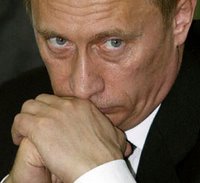New risks to Russian civil society
 Russian President Vladimir Putin is at it again. I'm not sure if he's just a misguided democrat or a calculable autocrat. There's news that Russia's lower house today approved a draft bill supported by the Kremlin that would put serious restrictions on all NGOs working in Russia. A key component of the legislation is the restrictions that it puts on foreign NGOs, presumably an effort by Moscow to prevent foreign support for political activity in the country. If foreign NGOs don't register with Russian authorities and subject themselves to random document searches, they'll have to close their offices in the country.
Russian President Vladimir Putin is at it again. I'm not sure if he's just a misguided democrat or a calculable autocrat. There's news that Russia's lower house today approved a draft bill supported by the Kremlin that would put serious restrictions on all NGOs working in Russia. A key component of the legislation is the restrictions that it puts on foreign NGOs, presumably an effort by Moscow to prevent foreign support for political activity in the country. If foreign NGOs don't register with Russian authorities and subject themselves to random document searches, they'll have to close their offices in the country.Add this to Putin's recent efforts to shift more power to the Kremlin: he turned state governorships into Kremlin appointments from democratic elections, and the state owns an alarming portion of the country's energy/media industries, to name but a few. Look also at the legal proceedings against former Russian energy magnate Mikhail Khodorkovsky, who many pundits suggest was targetted because of his efforts to play a political role. The majority in Parliament is a party called United Russia that essentially follows the Kremlin line, and Putin was re-elected in 2004 with around 70% of the vote. It doesn't paint a very encouraging picture of a nation purportedly on the path to democracy.
I don't want to suggest categorically that Putin is a tyrant or dictator aiming to return the country to its totalitarian Tsarist/Soviet roots - as I mentioned earlier, it's equally possible that he is merely trying to make the country work as efficiently as possible. But his efforts to date haven't been beneficial for Russian democracy, nor for foreign opinion of Russia. And the proposed new NGO rules will stifle a great deal of good work that is done in the country - and for that, there is no excuse.



